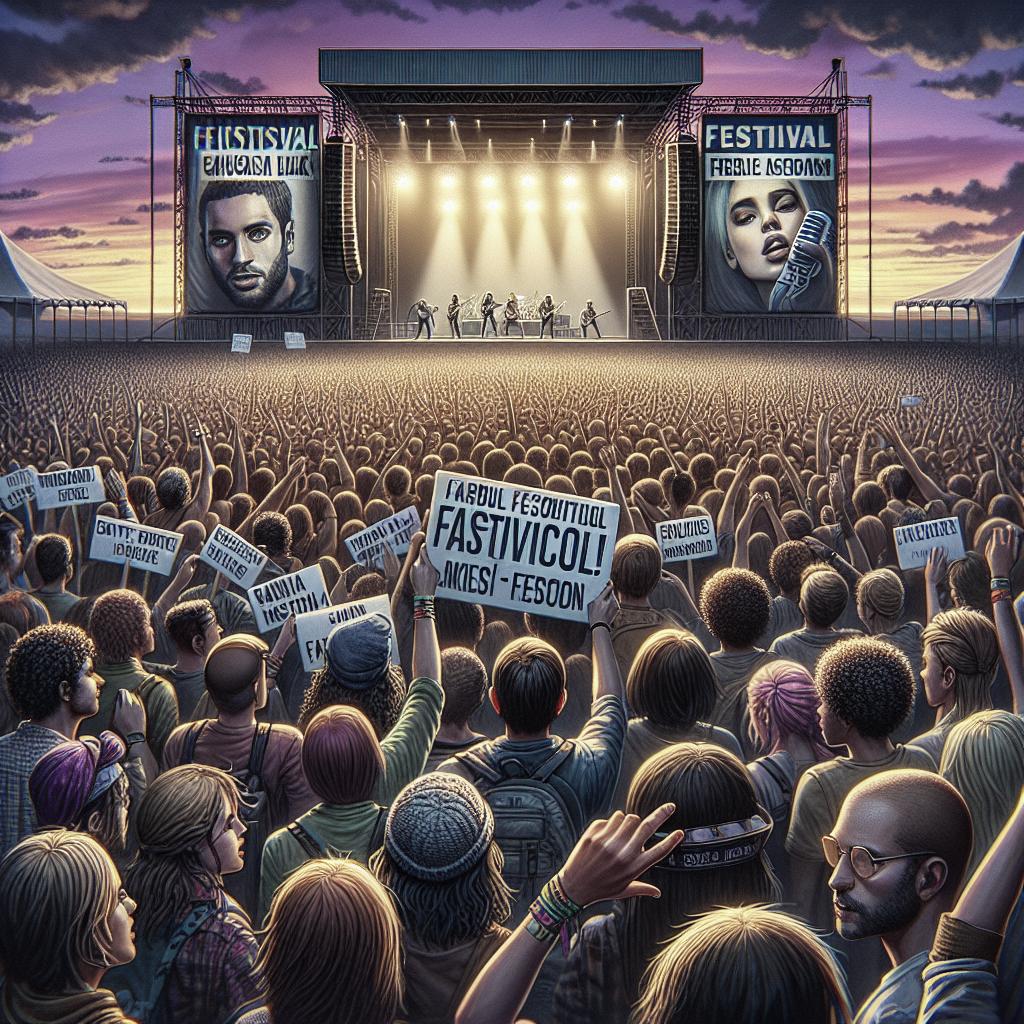<>
When it comes to music festivals, there’s a new trend that’s creating quite the buzz: private concerts offered by artists. While some see this as a way to elevate the festival experience, there’s a growing perspective that such exclusivity can actually do more harm than good. In this blog post, we’ll explore the reasons behind this unpopular opinion. We’ll analyze how the concept of “access” has been misconstrued, discuss the negative behaviors nurtured by such practices, and address the missed opportunities for meaningful engagement with fans. We’ll also consider alternative ways to raise awareness without devaluing the festival experience. By the end, you’ll understand why some believe that concerts shouldn’t be free, but content should—offering you a different angle on how experiences and engagement can be maximized.
An Unpopular Opinion
Private concerts at festivals often create a polarizing response. On one hand, the promise of an intimate performance by a top artist can make fans feel extraordinarily special. On the other, critics argue that this exclusivity undermines the communal spirit of festivals. The latter opinion may not be the popular one, but it has been gaining traction. Festival-goers who can’t afford these premium experiences may feel alienated, and this separation goes against the very essence of what makes festivals a unique and inclusive space. With skyrocketing ticket prices and additional costs for private performances, it becomes clear that these exclusive concerts are a premium few can afford. This shift can be seen as problematic, promoting a culture of exclusivity that undermines the shared experience traditionally central to music festivals. It raises questions about the very nature of access and what it means for the future of festivals.
1. We have misconstrued the meaning of “access.”
The idea of “access” shouldn’t be viewed as a binary switch that is either on or off; it has layers and nuances. True access is about inclusivity and sharing experiences, not about segregating audiences into tiers based on their willingness to pay extra. When we uphold private concerts as the pinnacle of the festival experience, we inadvertently suggest that the shared communal experience of a festival is insufficient. Festivals should be avenues for fans to connect, celebrate, and enjoy music collectively. By fragmenting these experiences into private segments, the very foundation of this gathering is shaken. True access enriches the festival experience as it allows everyone to feel valued, irrespective of their pay scale. This is a crucial aspect that seems to be overlooked in the race to monetize every possible element of a festival.
“Access isn’t a binary issue.”
Access, contrary to popular belief, is not a zero-sum game. It’s not simply about being in or out but about various degrees of engagement and participation. A festival that provides different ways to experience music and culture without making it contingent on premium pricing models respects this nuanced understanding of access. A model that adopts tiered experiences without alienating the general audience can be far more beneficial. Providing different types of shared experiences at varying price points, while still offering free communal events, honors the spirit of inclusivity and allows everyone to participate meaningfully.
2. It trains for behavior we don’t want.
By promoting private concerts as a sought-after premium experience, festivals run the risk of training their audience to always look for exclusive, paid segments rather than engaging with the collective experience. This mentality could eventually erode the communal spirit that festivals thrive on, replacing it with a sense of consumerism focused on obtaining ‘exclusive’ moments. This behavioral shift also has broader implications for music culture. The focus moves from the music itself to the exclusivity of the experience, creating a scenario where enjoyment is measured by how special and private an event is, rather than its actual quality. This could fundamentally alter how future audiences value and interact with live music.
3. Can’t capture patron info for future marketing.
One of the overlooked downsides of private concerts is the missed opportunity to gather valuable patron data for future marketing efforts. General admission events allow organizers to tap into a wealth of information about their audience’s preferences, behaviors, and demographics. In contrast, private concerts segment this information into smaller, less comprehensive data sets, limiting the effectiveness of future marketing campaigns. Captured data from a more inclusive event can provide better insights into the interests and behaviors of a diverse audience. This can aid in crafting more effective promotions, leading to increased engagement and, ultimately, more robust festival experiences for all attendees.
4. It says our product has no value.
When festivals place a significant emphasis on private concerts, it inadvertently suggests that the general festival experience is not valuable enough on its own. This undermines the value of the shared experience that is intrinsic to festivals. By creating tiers based on exclusivity, you may convey that the main event lacks substance and that only the premium experiences are worthwhile. This can be especially harmful when trying to attract new attendees or retain long-time fans who may feel that the festival no longer appreciates their participation unless they are willing to pay for added privileges. Maintaining the inherent value of the general admission experience is crucial for sustaining long-term engagement and loyalty.
“It’s not just nonsense to run our organizations this way; it’s rudimentary if not incompetent.”
Structuring festivals around exclusive, private concerts might feel like a smart business decision aimed at maximizing profits, but it is shortsighted. Running festivals in a way that prioritizes exclusive access over inclusivity ignores the foundational values of festival culture. It’s not just nonsensical; it’s arguably an incompetent approach that fails to see the bigger picture. The true essence of a festival lies in community and shared musical experiences. Any model that shifts focus away from these core values in favor of profit will ultimately harm the festival’s longevity and reputation. It’s essential for organizers to recognize that sustainable success comes from inclusivity and community, not exclusivity.
5. It makes the case for support harder.
When a festival leans heavily on private concerts and exclusive experiences, it becomes challenging to make a compelling case for wider community or corporate support. Sponsors and donors typically look for platforms that reflect wide-reaching engagement and community values. By creating an environment where only a select few can enjoy the full range of experiences, festivals might struggle to attract broader support. Moreover, publicly-funded or charity-based festivals might face backlash for appearing to prioritize profit over community value. Ensuring that there are sufficient, engaging experiences for all attendees can make it easier to build robust support networks, attracting both sponsors and loyal fans who feel genuinely valued.
What to Do Instead — Other Ways to Raise Awareness
There are myriad ways to raise awareness and engage audiences without resorting to exclusive private concerts. For instance, interactive workshops, immersive art installations, and community-driven projects can provide unique and enriching experiences that add genuine value without creating divides among attendees. These can be sponsored by companies wanting to associate their brand with innovative and inclusive practices, offering a win-win situation. Festivals can also leverage social media and digital content to engage with a global audience. Live streaming certain performances and behind-the-scenes content can offer fans who can’t attend in person a way to engage with the festival. This approach not only builds community but also extends the festival’s reach, creating more opportunities for engagement and support.
Concerts Shouldn’t Be Free, But Content Should
Charging for concert tickets is understandable; artists and organizers need to cover costs and make a profit. However, making valuable content accessible can bridge the gap between paid live experiences and broader engagement. Offering free content such as interviews with artists, behind-the-scenes looks, and curated playlists can maintain interest and interaction with the fan base year-round. This approach ensures that while the live experience retains its value, fans who may not attend in person still feel connected and invested. It’s about creating a balance that respects the need to monetize certain aspects while ensuring that the broader audience remains engaged and valued.
Get free resources and articles like this every month when you subscribe.
By subscribing, readers can gain access to exclusive content, resources, and articles that expand on the topics discussed. Offering this kind of content for free sustains interest and engagement, encouraging a sense of community and loyalty amongst the readership.
About the Author
Lucas Martin is a seasoned journalist and communications graduate with extensive experience in local media and blog writing. With a passion for travel, technology, and innovation, Lucas brings a dynamic and engaging perspective to his writing. He aims to work for online media or technology-focused companies and is constantly honing his SEO writing skills to stay ahead of industry trends.
| Section | Main Points |
|---|---|
| An Unpopular Opinion | Private concerts at festivals create exclusivity, alienating general attendees and undermining the communal spirit of festivals. |
| 1. We have misconstrued the meaning of “access.” | Access should be about inclusivity, not a paywall. More inclusive experiences enrich festivals. |
| “Access isn’t a binary issue.” | Access comes in degrees. Tiered experiences should not alienate the general audience. |
| 2. It trains for behavior we don’t want. | Promoting private concerts shifts focus from communal experiences to consumerism, altering audience values. |
| 3. Can’t capture patron info for future marketing. | Private concerts segment valuable patron data, limiting future marketing efficiency. |
| 4. It says our product has no value. | Focusing on exclusivity undermines the intrinsic value of the general festival experience. |
| “It’s not just nonsense to run our organizations this way; it’s rudimentary if not incompetent.” | Prioritizing exclusivity over inclusivity is a shortsighted, incompetent approach that undermines the festival culture. |
| 5. It makes the case for support harder. | Exclusive experiences make it difficult to attract broader community or corporate support. |
| What to Do Instead — Other Ways to Raise Awareness | Interactive workshops, community projects, and leveraging digital content can offer unique and inclusive engagement. |
| Concerts Shouldn’t Be Free, But Content Should | Charge for concerts but offer valuable content for free to maintain interest and engagement. |


